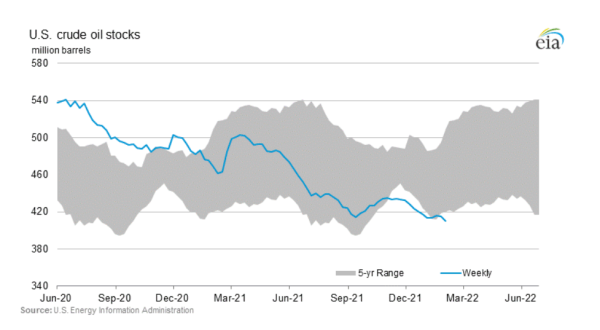Although the
price of crude oil is hovering around $90 a barrel as of now, the US crude oil
inventories dropped for two successive weeks, implying that the demand is in
the recovery mode despite the surge in relatively mild Omicron variant of the Coronavirus.
The EIA, US
Energy Information Administration, reported that the US crude inventories fell
by 4.8 million barrels for the week ending February 4, on Wednesday.
Last week,
the EIA said in its weekly data release that the US inventories fell by more
than 1 million barrels.
The consistency
in falling US inventories helped crude oil markets to maintain the current
price levels, despite that being detrimental to the recovery of global
economies, battered by Covid-19.
For instance,
in India, the world’s third biggest consumer, the use of diesel fell by 12.8%
in January; since 40% Indian fuel consumption is diesel, its impact has been
widely felt by the country’s crude oil sectors.
Of course,
the state-wide curbs on the freedom of movement may have played a significant
role in the fall of consumption of fuel in India. Analysts, however, believe
the rising oil prices is factor behind the fall.
In addition,
the consumption of gasoline or petrol fell by 12.2%, which coincides with the
falling vehicle sales.
In light of
these developments, economists believe that high oil prices formed a drag on
the demand – and hopes of a full recovery. The growth in economy was also
affected during January, 2022.
In these
circumstances, Saudi Arabia raised the price of crude oil for the region – and beyond
– and the move will not certainly go down well with the Indian consumers as far
as the oil price is concerned.
Against this
backdrop, the US announced sanction waivers to Iran as a stepping stone to stand
and throw an anchor in salvaging the 2015 Iran nuclear deal; it has been oscillating
between hope and abject failure since the Biden administration started talks with
its Iranian counterpart.
Perhaps, the
US administration must have thought that the move would calm the crude oil
markets. Iran, meanwhile, is sticking to its guns demanding the removal of all
sanctions.
The tug of war
continues with both sides digging their heels and there is no sign of hope of
reviving the JCPOA, 2015 nuclear deal, at the present, despite the negotiations
being in the final stage.
Analysts are
watching the developments in Vienna where the talks take place, as it can
determine the direction of price movement of crude oil in the short-run pretty accurate.







